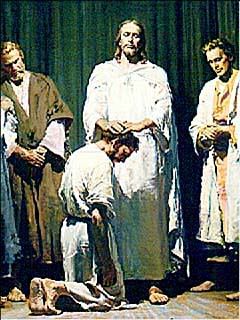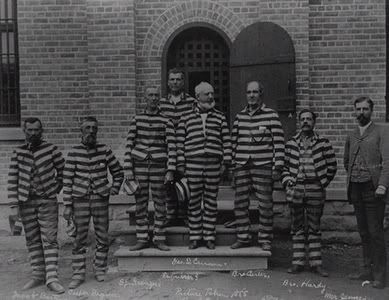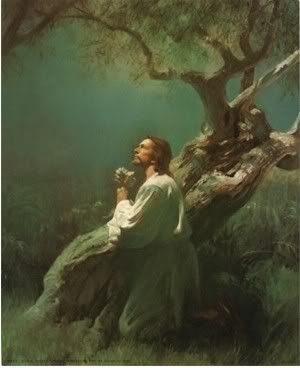Heb. 1: 1-2 God, who at sundry times and in divers manners spake in time past unto the fathers by the prophets, Hath in these last days spoken unto us by his Son,
1 Tim. 2: 5 For there is one God, and one mediator between God and men, the man Christ Jesus;
Orthodox go way beyond the mark with their interpretation of these scriptures. Instead of interpreting this as an expression of appreciation for Gods word given to us by His Son Jesus Christ and that acceptance of Christ sacrifice is the only way to salvation, Evangelicals are told to believe that these scripture reveal that the priesthood has no more operation in Christ's church, there is to be no other prophets and apostles because Christ is our only mediator, and there is to be no additional revealed scripture and the canon and the heavens are closed. God has given His word by His Son and that Word is all sufficient just like Christ's blood. Why would you even want more after you have heard it from Christ himself. What is Christ not good enough for you?
This is a nice tidy doctrine on its surface, except for the fact that Christ never wrote down any of his own words, and He promised his chosen servants would do greater works and reveal greater words than even He had done after his ascension.
John 14: 12 Verily, verily, I say unto you, He that believeth on me, the works that I do shall he do also; and greater works than these shall he do; because I go unto my Father. Christ's words and these "greater works" were recorded by eye-witnesses of His resurrection. These were the Apostles and Evangelists who were given the Holy Ghost which was to "bring all things to your remembrance, whatsoever I have said unto you" (
John 14: 26). And even though Mark and Luke were not Apostles, they were companions to the Apostles. Luke was from Antioch was likely a travel companion to Paul and may have been an eye witness of his conversion.
Except Paul wasn't even one of the original 12 Apostles. Matthias was chosen to replace Judas, not Paul. "For it is written in the book of Psalms, Let his habitation be desolate, and let no man dwell therein: and his bishoprick let another take" (
Acts 1: 20). However, and Evangelical explained to me that Matthias wasn't God's choice to take Judas' spot. Because the remaining 11 had merely cast lots, Jesus Christ appeared to Saul of Tarsus and Paul became Christ's choice as special "eye witness" to the resurrection and the 12th Apostle instead of Matthias.
Also, orthodox belief tells us to ignore when others are called Apostles like Barnabas and James. In spite of being referred to as apostles in the same sense as Paul (
Gal. 1: 19,
Acts 14: 14). Orthodox belief claims that apostles can be used in a generic sense meaning "one who is sent." Orthodox interpretation suggests that Barnabas and James (the brother of Christ) were referred to as apostles in the same sense as Junia (a feminine name) and Andronicus (
Rom. 16: 7). But I would add, Paul doesn't call Junia and Andronicus apostles. Paul says they are "of note among the apostles," which means their example, sacrifice, works, and doings have been "noteworthy" and "spoken of with high regard" among the apostles.
So, what is going on here. Well Christ taught that His church would be "build upon a foundation" or led by apostles and prophets and that the quorum of 12 Apostles was meant to be a standing quorum for the government of His church to clarify doctrine, ordain leadership, and bare a special witness of Jesus Christ in all the world. And we clearly see the Apostles and the Seventy (
Luke 10: 1, 17) act in this capacity in the Book of Acts written by Luke.
1 Cor. 12: 28-29 And God hath set some in the church, first apostles, secondarily prophets, thirdly teachers, after that miracles, then gifts of healings, helps, governments,
Eph. 2: 20 And are built upon the foundation of the apostles and prophets, Jesus Christ himself being the chief corner stone; Eph. 4: 11 And he gave some, apostles; and some, prophets; and some, evangelists; and some, pastors and teachers; For the perfecting of the saints, for the work of the ministry, for the edifying of the body of Christ: Till we all come in the unity of the faith, and of the knowledge of the Son of God, unto a perfect man, unto the measure of the stature of the fulness of Christ: Notwithstanding orthodox interpretation, there is no evidence to suggest that the proceeding scriptures referred to only the original 12 or 13 Apostles just like the church now can't possibly be expected to stand upon the works of the original evangelists, pastors, and teachers alone. That would put a lot of evangelical pastors out of work. The Bible taught that when one apostle or pastor died or was martyred, another was to be chosen to replace him by prophesy and by the laying on of hands; not by casting lots.
1 Tim. 4: 14 Neglect not the gift that is in thee, which was given thee by prophecy, with the laying on of the hands of the presbytery. However, when the last apostle was martyred, the authority and keys of the apostleship were lost. Consequently, Christ church could no longer function because the keys Peter held could not be passed down by the laying on of hands. The unbroken line of priesthood authority was broken (a very important doctrine for my Catholic friends). Consequently, there no longer existed someone in the church who could continue to receive revelation, interpret scripture, and choose and ordain leadership such as pastors and teachers. This period was known as the Great Apostasy and was foretold in the Bible (
Dan. 2: 45,
Amos 8: 11,
2 Thes. 2: 3,
Acts 20: 29,
Rev. 12: 6).
After the martyrdom of the Apostles, there was a lot of discordant belief in the early Christian church. The church was plagued by mysterious Gnostic and Coptic doctrine and practices as well as being plagued by concocted and contrived pseudopigriphal writings. After a few centuries without the Apostles, there was no one to declare doctrine and interpret scripture and there were all kinds of different beliefs which claimed to be Christian. Consequently, Constantine called the first ecumenical council to establish orthodox doctrine. While well meaning, those councils voted on and accepted doctrine that had been mixed with Greek philosophy (especially Plato who taught that matter was evil and God was immaterial). This new apostate, creedal doctrine, was considered orthodox and was enforced by capital punishment.
However, no one in the Universal or Catholic church had the keys or authority of the priesthood to call such a council. Although, lots were cast in favor of these new doctrines and creeds; the doctrines like Matthias (accepting orthodox belief about Matthias), weren't God's choice.
Other Christians do not consider the LDS faith to be Christian because, while we accept Christ atonement as the only means for salvation, and we recognize the divinity of Christ; we reject their non-biblical, extra-canonical creeds which were established in the 4th-century or later. I don't see how Protestants have any reasonable basis for excluding the LDS faith from being Christian on that basis. If they think the ecumenical councils of the Catholic Church had authority to establish and define correct doctrine, then why are they not Catholic?
Again, Christ taught His Apostles that they would do even greater works and reveal greater words than even He had done (
John 14: 12 ). But is Priesthood involved here, or would these greater works be done by the Holy Ghost alone? When Paul told Timothy to "neglect not" his gift which was given by prophecy and by the laying on of hands, was Paul referring to Priesthood or just the Holy Ghost? (
1 Tim. 4: 14). When Christ taught his Apostles, "Ye have not chosen me, but I have chosen you, and ordained you" (
John 15: 16), to what where the Apostles ordained? And when Peter was promised the "keys of the kingdom (
Matt. 16: 19)," was that speaking of the priesthood or the Holy Ghost?
With the beginning of the Church of Jesus Christ of Latter-day Saints, the resurrected Jesus Christ appeared to the boy Joseph Smith and called him as a prophet and apostle or special witness of Christ just like Paul. And through Joseph Smith the keys and authority of the priesthood which is the authority to confer the gift of the Holy Ghost was restored to the Earth. Also, the understanding and interpretation of the true roll and relationship of the priesthood and the Holy Ghost has been clarified. This understanding hasn't come by casting lots, or voting; but by revelation to a prophet of God which has been recorded as additional Holy Scripture.
So, what is that relationship? The roll of the Holy Ghost is to allow any individual who processes it to know the mind and will of God. All those who have accepted and become justified by the blood of Jesus Christ have right to the sanctifying power of the Holy Ghost. The promptings and influence of the Holy Ghost can be described as a "still small voice" (
1 Kgs. 19: 12) or a "burning in the bosom" (
Luke 24: 32). But no one is perfect, and sometimes we will reject the promptings of the Holy Ghost which will lead us to read scripture, partake of the Lord's Supper, and enter into covenants and ordinances with God such as baptism. All of these things having been prepared for the sanctification of the disciples of Christ.
But, because man at times rejects the Holy Ghost, we reject Christ (
John 13: 20). Consequently, we cut ourselves off from the mind and spiritual presence of God. Therefore, God has a backup plan. God has given us the priesthood. God has ordained certain men who can do the same thing as the Holy Ghost on our behalf. An individual with the Priesthood has the authority, depending on his stewardship (jurisdiction), to tell others the mind and will of God and to reveal to them what the Holy Ghost will be inspiring and empowering them to do in their process of sanctification. Therefore, those of us not responding to the Holy Ghost, can be motivated to repent, and turn again to Christ, and continue on in the process of sanctification. While the Holy Ghost gives the individual the authority to receive revelation for themselves, the priesthood is the authority to receive revelation and perform service for others.
So, while it is true that the Holy Ghost may empower me to forsake sin in one area and may empower you to forsake sin in another area, and I shouldn't judge myself to be more righteous than you. As long as we both remain in the grace of Christ, and endure to the end, it doesn't matter where on the straight and narrow path we are when we die, so long as we are on it, Christ's grace will be sufficient for us. However, the nature of Christ's atonement does not preclude or prohibit modern prophets from telling us that God wills all his disciples that they be baptised, attend church, read the scriptures and that the Holy Ghost will empower us in the accomplishment of these works. And that our reception of these works then become a manifestation of the grace of Christ working in us and a testimony of the power of Christ's atonement for we can do no good works of ourselves.
It turns out that modern prophets have said that receiving the priesthood is also necessary to enter into the presence of God. In the Old Testament only the oldest son, or a certain tribe was given rights to the priesthood. But now, the priesthood has been made available to all men and by temple work for the dead it has been made available to all those who would have accepted it while living. This doctrine is referred to as the "priesthood of all believers." But, while orthodox churches call it priesthood, they really don't believe priesthood operates in the same way as in Bible times. The "so-called" orthodox belief claims that Jesus Christ is our only High Priest. Of course, this does not apply to their pastor.
Heb. 3: 1 Wherefore, holy brethren, partakers of the heavenly calling, consider the Apostle and High Priest of our profession, Christ Jesus; LDS know that we are to walk in the foot steps of Jesus Christ. Scriptures like this do not mean that there are not to be any more Apostles, or prophets, or High Priests. Rather, this scripture invites all men to become like Christ and be made High Priests. Christ being our Great High Priest.
Therefore, in the LDS church all worthy males are ordained by prophecy and by the laying on of hands by those who have an unbroken line of authority to Joseph Smith and from Joseph Smith to Peter James and John who received their authority under the hands of Jesus Christ himself. LDS men are first ordained deacons, teachers, and priests in the Aaronic or preparatory priesthood. This is the priesthood that was given to Aaron and the Levites to offer sacrifice and set up the tabernacle and provide for the maintenance and upkeep of the temple. It is also the authority of John the Baptist who had the authority to preach the gospel of repentance, and baptise by immersion and receive the administration of angels.
Then an LDS male is ordained to the Melchizedek or Higher priesthood (After the order of the Son of God) and given the power and authority to ordain others in the priesthood, preside in Christ's church, and confer the gift of the Holy Ghost (baptism by fire). There are different offices in the Melchizedek priesthood. First a male is ordained to the office of an elder and then as he gains experience in leading the church he is called to the office of a High Priest. Modern revelation says that the Melchizedek priesthood has the power and authority to make it possible for a man to return into the presence of God.
Heb. 5: 1-10 For every high priest taken from among men is ordained for men in things pertaining to God, that he may offer both gifts and sacrifices for sins: Who can have compassion on the ignorant, and on them that are out of the way; for that he himself also is compassed with infirmity. And by reason hereof he ought, as for the people, so also for himself, to offer for sins. And no man taketh this honour unto himself, but he that is called of God, as was Aaron. So also Christ glorified not himself to be made an high priest; but he that said unto him, Thou art my Son, to day have I begotten thee. As he saith also in another place, Thou art a priest for ever after the order of Melchizedek. Who in the days of his flesh, when he had offered up prayers and supplications with strong crying and tears unto him that was able to save him from death, and was heard in that he feared; Though he were a Son, yet learned he obedience by the things which he suffered; And being made perfect, he became the author of eternal salvation unto all them that obey him; Called of God an high priest after the order of Melchisedec. Paul says to the Hebrews, that every high priest is ordained to offer gifts and sacrifices for sin. Paul is not talking about past high priests but talking in the present tense. Paul isn't confused about the past or the present because he then says that "no man taketh [the priesthood] unto himself, but he that is called of God, as was Aaron." And how was Aaron called in the past? Aaron was called by a revelation given to Moses and then he was washed, anointed in the tabernacle and clothed in the robes of the priesthood and then ordained to his calling by the laying on of hands by Moses.
Today in Christ's church both men and woman are washed, and anointed, and clothed in the robes of the priesthood as was Aaron in modern-day temples. As the role of women in the home is respected and they do not need to be troubled with the burden of setting up chairs at church and doing other administrative tasks outside the home, woman are not given priesthood responsibility other than their office of mothers and positions as part of helps and governments in the kingdom such as the relief society, young women's , and primary organizations (
1 Cor. 12: 28-29).
So, just as Christ was considered a High Priest after the order of Melchizedek, and due to service in this order; Jesus Christ was made perfect by obedience to the will of His father. Therefore, all men are commanded to receive this same order of priesthood and become like Jesus Christ, and follow the Savior. And Just as we follow Christ into the waters of baptism, the Holy Ghost will sanctify us in our exercize of this authority and empower us to become kings and priests unto the Most High God. And when Christ comes in the Millennium, He will rule and reign as a King of kings, Lord of lords, Judge of judges, and the Great High Priest of high priests. Like scriptures, and the church, the priesthood has been given to men for their sanctification to prepare us to enter into the presence of God so that when he appears, we will be like Him (
1 Jn. 3: 2).
And what about the Holy Ghost? While the Priesthood is the authority to act in the name of God. The Holy Ghost is the power. So, those with the priesthood can not exercize the priesthood except through the grace of Jesus Christ and upon the principles of righteousness. Holders of the priesthood are invited to receive a greater portion of the Holy Ghost so as to empower their authority the same as we talk about "empowering moral authority."
D&C 121: 36-37, 41 That the rights of the priesthood are inseparably connected with the powers of heaven, and that the powers of heaven cannot be controlled nor handled only upon the principles of righteousness. That they may be conferred upon us, it is true; but when we undertake to cover our sins, or to gratify our pride, our vain ambition, or to exercise control or dominion or compulsion upon the souls of the children of men, in any degree of unrighteousness, behold, the heavens withdraw themselves; the Spirit of the Lord is grieved; and when it is withdrawn, Amen to the priesthood or the authority of that man. . . . No power or influence can or ought to be maintained by virtue of the priesthood, only by persuasion, by long-suffering, by gentleness and meekness, and by love unfeigned; Therefore, because the Holy Ghost is the power by which the Priesthood authority operates, we see that the Holy Ghost had operation in Old Testament times any time the priesthood was being exercized as well. But, the operation of the Holy Ghost in the OT was even seen in a limited bases apart from the authority of the preisthood. After Moses was inspired to ordain 70 men to assist him in the judgement and government of the tribes of Isreal, 2 men who where not ordained were seen prophesying. Eldad and Medad had not yet been ordained as Seventy, but had the Holy Ghost rest on them and empower them to prophesy in the camp.
Num. 11: 24-29 And Moses went out, and told the people the words of the Lord, and gathered the seventy men of the elders of the people, and set them round about the tabernacle. And the Lord came down in a cloud, and spake unto him, and took of the spirit that was upon him, and gave it unto the seventy elders: and it came to pass, that, when the spirit rested upon them, they prophesied, and did not cease. But there remained two of the men in the camp, the name of the one was Eldad, and the name of the other Medad: and the spirit rested upon them; and they were of them that were written, but went not out unto the tabernacle: and they prophesied in the camp. And there ran a young man, and told Moses, and said, Eldad and Medad do prophesy in the camp. And Joshua the son of Nun, the servant of Moses, one of his young men, answered and said, My lord Moses, forbid them. And Moses said unto him, Enviest thou for my sake? would God that all the Lord’s people were prophets, and that the Lord would put his spirit upon them! So, we clearly see that although it sounds neat and tighty to say there was priesthood in the OT and Holy Ghost in the NT, it just isn't so. And only through the restored authority of God's priesthood and modern prophets and apostles has the true doctrine on the relationship between the power of the Holy Ghost and the authority of the Priesthood been clarified after thousands of years of casting lots on the subject.
 Many "so-called" orthodox or evangelical Christians interpret the Bible to teach that Priesthood has no operation since the resurrection of Christ. They claim the Bible teaches that God spoke to a few men known as prophets via the priesthood in the Old Testament. But now, in the New Testament and since the resurrection of Christ, God talks to all men only through the Holy Ghost. Except that Christ did ordain Apostles to head His New Testament church but all their works and administration were done by the Holy Ghost and not Priesthood authority.
Many "so-called" orthodox or evangelical Christians interpret the Bible to teach that Priesthood has no operation since the resurrection of Christ. They claim the Bible teaches that God spoke to a few men known as prophets via the priesthood in the Old Testament. But now, in the New Testament and since the resurrection of Christ, God talks to all men only through the Holy Ghost. Except that Christ did ordain Apostles to head His New Testament church but all their works and administration were done by the Holy Ghost and not Priesthood authority.
















